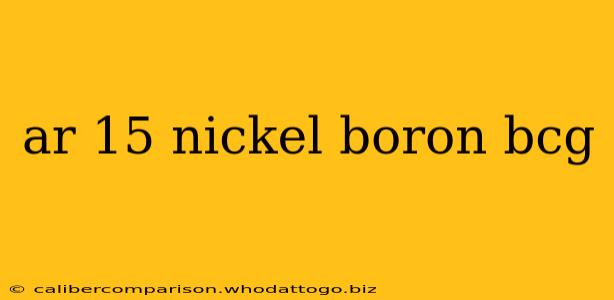The heart of your AR-15, the bolt carrier group (BCG), is subjected to immense stress. Choosing the right BCG can significantly impact your rifle's reliability and longevity. Nickel Boron (NiB) coated BCGs have gained significant popularity, but are they worth the investment? Let's delve into the specifics of AR-15 NiB BCGs, exploring their advantages, disadvantages, and whether they're the right choice for you.
What is a Nickel Boron BCG?
A nickel boron BCG is a standard AR-15 bolt carrier group with a special surface treatment. This coating isn't just for looks; it offers several key performance enhancements. The NiB process applies a thin layer of nickel boron to the bolt carrier group's components, including the bolt, carrier, and cam pin. This creates a remarkably hard and slick surface.
Advantages of an AR-15 Nickel Boron BCG
-
Reduced Friction: The primary benefit is significantly reduced friction. This translates to smoother cycling, especially in adverse conditions like those involving fouling from dirty ammunition or extended use. Less friction means less wear and tear on the BCG and the rest of your firearm.
-
Enhanced Reliability: The smoother operation contributes directly to improved reliability. You're less likely to experience malfunctions due to friction-related issues, even after many rounds fired. This is particularly beneficial for individuals who live in harsh climates or frequently shoot in adverse conditions.
-
Increased Durability: The NiB coating is exceptionally hard, offering superior resistance to wear and corrosion compared to standard phosphate-coated BCGs. This translates into a longer lifespan for your BCG, making it a potentially cost-effective choice in the long run.
-
Easier Cleaning: The slick surface of a NiB BCG makes cleaning significantly easier. Fouling is less likely to adhere to the surface, and what does adhere cleans up more quickly and easily. This reduces maintenance time and effort.
Disadvantages of an AR-15 Nickel Boron BCG
-
Cost: NiB BCGs generally cost more than standard phosphate-coated BCGs. This is due to the more complex coating process.
-
Potential for Coating Damage: While durable, the NiB coating can be damaged by improper cleaning techniques or extremely harsh environments. Using abrasive cleaners or aggressive cleaning methods can compromise the coating's integrity.
-
Not Always Necessary: For casual shooters or those who primarily shoot in clean conditions, the advantages of a NiB BCG might not outweigh the increased cost. A standard phosphate-coated BCG can be perfectly reliable in many situations.
Choosing the Right BCG: Phosphate vs. Nickel Boron
The choice between a phosphate and NiB BCG ultimately depends on your individual needs and shooting habits.
-
Phosphate BCG: A cost-effective option that's perfectly adequate for many shooters. It's suitable for recreational shooting in relatively clean conditions.
-
Nickel Boron BCG: The premium choice, offering enhanced reliability, durability, and ease of cleaning. Ideal for competitive shooters, those operating in harsh environments, or anyone who prioritizes maximum reliability and longevity.
Conclusion
AR-15 nickel boron BCGs offer significant advantages in terms of reduced friction, enhanced reliability, increased durability, and easier cleaning. However, they come at a higher price. Consider your shooting habits, environmental conditions, and budget when making your decision. For many users, the added performance and longevity make the premium price worthwhile. If you're looking for peak performance from your AR-15, a NiB BCG is definitely worth considering.

